SEG Automotive helps automakers in India become future-ready
The Bangalore-based Tier 1 supplier of starter motors, generators, start/stop and mild-hybrid fuel-efficient solutions says it has what it takes to help vehicles deliver improved fuel economy and reduced CO2 emissions.
With BS VI emission norms to kick in by April 2020 and now barely 20 months away, OEMs and their supplier chain are actively engaged in accessing and employing new technologies and products that help them give an edge in the market.
Of the many Tier 1 suppliers working in this sphere of activity is SEG Automotive India, the Indian arm of Stuttgart-based SEG Automotive, which is a technology leader in starter motors, generators, start/stop and mild-hybrid fuel-efficient solutions for three-wheelers, passenger cars, light and heavy commercial vehicles. Its goal is enable automakers shape a sustainable future through improving fuel economy and in turn reducing CO2 emissions.
The combustion engine dominates the automotive industry and will remain a pillar of individual mobility for at least another decade or so. SEG Automotive says it has the tools to shape the industry's journey from the combustion engine to electrification by delivering efficient solutions for CO2 reduction – regardless of the drive technology
SEG, which derives its name from the first three letters of Starter motors, components for Electrification and Generators, has been in India since three decades. The company has three manufacturing facilities at Naganathapura and Hassan in Karnataka and one at Chennai. SEG Automotive India, founded in 1989 as Bosch Ltd, was one of the first local companies producing starter motors and generators in India. In early 2018, the unit was renamed SEG Automotive India under the Chinese Zhengzhou Coal Mining Machinery Group which bought the business from Bosch globally.
SEG Automotive India’s starter motors and generators are used in almost all the popular cars in India. Besides the large volumes of the PV segment which includes supplies right from entry-level cars to premium luxury cars, it is quite strong in the three-wheeler and off-road segments too. The company not only supplies to the current generation of cars but is also working on a number of new future programmes for new cars to be launched over the next few years.
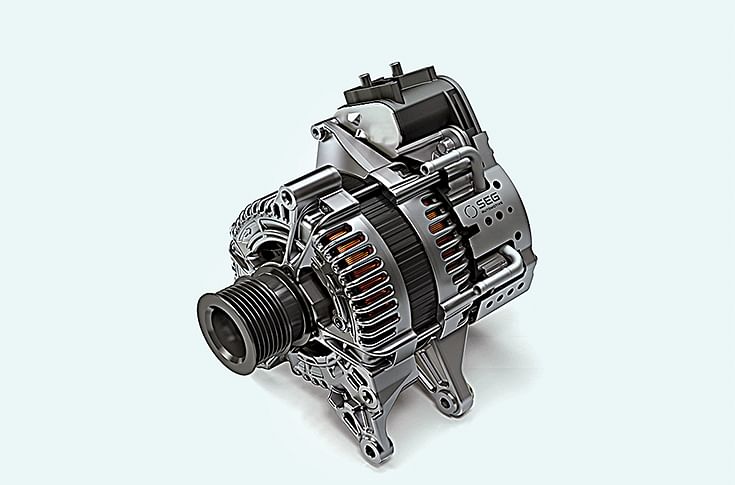
A 48V boost recuperation machine.
As is known, the Indian automotive industry sector faces an increasingly growing challenge of growing and high pollution levels across major cities, high import bills of crude oil and unchecked traffic congestion. Speaking to Autocar Professional, Anil Kumar M R, managing director, regional president – India, SEG Automotive, said, “Keeping these challenges in mind, it is necessary for the auto industry to develop a sustainable strategy in India and reduce fuel consumption. We as a Tier 1 supplier have a major responsibility in shaping the sustainable future of the auto industry, together with the OEMs.”
High reliability, Made-in-India SC60 starter motor
SEG, which is the global leader in manufacture of starter motors, generators, and mild hybrid products, is also the market leader in start-stop technology worldwide and in India too. The company says its SC60 start-stop starter motor, with reliability of more than 250,000 starting cycles, is an ideal fit for the small petrol and diesel engines in the Indian market to realise the benefits of the start-stop function. SEG currently manufactures this starter motor locally with high local development and application contribution. At present, penetration of the start-stop system is increasing significantly in the Indian market, primarily driven by the total cost of ownership (TCO) and Corporate Average Fuel Consumption (CAFC) norms.
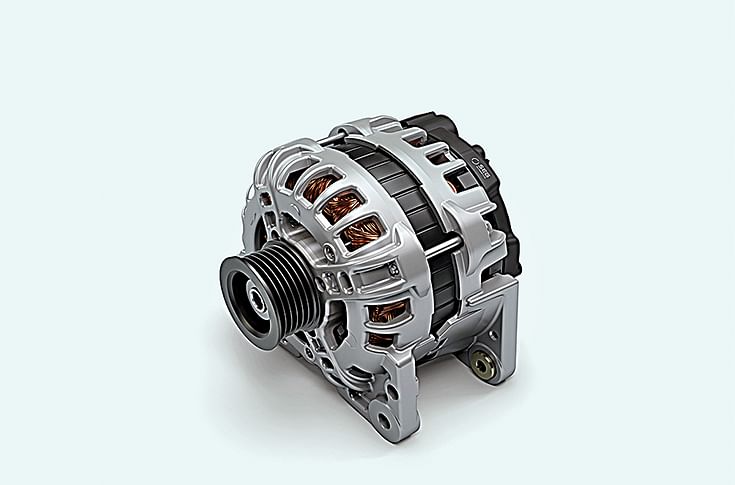
Baseline generator
The Boost Recuperation Machine (BRM) transforms a conventional combustion engine into a hybrid drive with minimal effort. BRM recuperates the energy while braking and stores the energy into the battery at 48V level. This energy is utilised by BRM to add torque to the engine in boost mode. Boost recuperation system gives a CO2 reduction of 15 percent. It also guarantees a powerful 48-volt electrical system, which is able to supply other sophisticated consumers such as roll stabilisers or electric brake force boosters. In autonomous driving mode, the auxiliary 48-volt electrical system ultimately ensures the redundancy required to satisfy the safety requirements.
SEG works closely with OEMs right from the concept development stage. At present, the company is working with leading OEMs on all future PV programs that are in the pipeline in next 2-3 years in India, as the starter and generator are developed right at the vehicle powertrain stage. “Also, as we develop new applications and make sure that these products are rightly adapted, our strength lies in application robustness. We have different types of testing to make the product perfectly fit those applications, bringing huge reliability into the product. So the product itself may be good but the application makes it even better,” says Kumar.
India, which is a large and growing market for SEG, is also an export hub with significant volumes being shipped to the ASEAN, Europe and Japan from its Indian plants.
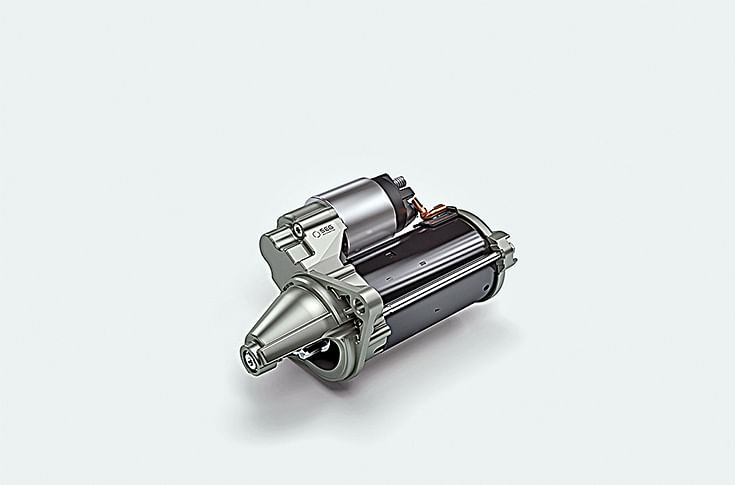
SC60 start-stop starter-motor
High localisation is a strong pillar of SEG’s growing exports from India. Other than a few electronics parts which are not locally available in India and continue to be imported, the company sources every product locally. Over the past three decades, the company has developed a wide supplier base which is matches global standards.
Practising lean manufacturing
What really gives an edge to SEG in India is the standardised manufacturing lines, offering flexibility in handling a varied range of products. SEG says the increased awareness and focus on reliability and quality requirements of the Indian market is at par with global markets.
To consistently manufacture high-quality products, the company follows lean practices with a focus on material flow, value addition, and waste elimination. For any manufacturing plant to be more efficient, the value chain (inbound -value add- outbound) should be seamlessly linked under one roof.
The lean line design at SEG prioritises safety and ergonomics at the India plant. The critical stations are controlled for safety with two hand actuators and safety curtains. The ergonomically designed lines and stations help in reducing operator fatigue and increase productivity – the height and reach of workstations, and point of use supply of sub-components to the assembly line. Manufacturing lines are also designed in smaller loops to reduce operator movements and enable standardised work. The direct and indirect operators are continuously trained on safety concepts. Further awareness is built through recording and eliminating near-miss incidents and driving continuous improvements with the help of safety committee inside and outside the hangar. The manufacturing process at all SEG plants in India is driven by lean principles, and the company employs a systematic approach for waste elimination through value stream design and its various tools.
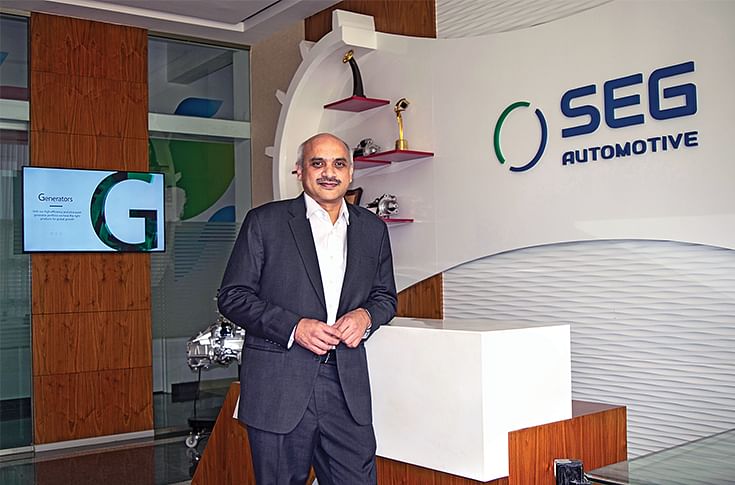
Anil Kumar M R: "We as a Tier 1 supplier have a major responsibility in shaping the sustainable future of the auto industry, together with the OEMs.”
On the R&D front, the company says its strength lies in its testing facilities where products are simulated for extreme operating conditions. The machines for most of these critical processes like welding, torquing, winding, magnetisation and testing are internally built. Kumar says, “Innovation is the core at our work and it’s in our DNA. We always look for the next big thing to support our OEMs by working jointly to develop solutions. We are closely working with our customers to support them on CO2 reduction, increase fuel economy and reduce TCO. This has been the focus and will continue to drive us in the future. Our USP of technology and quality continue to offer us an edge in the market by winning the trust of the customers.”
Getting Indian automakers to be future-ready
The next big change in the Indian automotive industry is the adoption of BS VI in 2020. SEG has for some time been already working in this area with Indian manufacturers to get them future-ready as it has global experience in offering solutions to Euro 6 vehicles. However, being a Tier 1 supplier with a focus on future technologies, the company is working for another big challenges coming in by 2022 in the form of CAFC norms. SEG is pre-engaging with many of its customers to reach the fleet average of 113 grams per kilometre. There are several technologies which work in combination including high efficiency of generators, start-stop technology of starters and also the use of mild hybrids. Being a full-line product supplier, customers would get the right choices to select the best suitable one.
Alternator assembly operation. Ergonomically designed lines and stations help in reducing operator fatigue and increase productivity.
Similarly, with vehicle electrification as a megatrend that is having its impact in India as also the government push on EVs, SEG is working on several solutions in the EV arena. Considerable research is underway at its German headquarters on EV-related technologies and while EVs are currently evolving globally, they will take time to set in India. For now though, in India, SEG has started working on products for light electrics for example, electric three-wheelers which are fast gaining popularity for their use in last-mile connectivity in cities. The company says it is already engaged with a few OEMs for validation of its EV-related products.
As it is for many global Tier 1 suppliers, India is a strategic market for SEG, which is why it is bullish on future opportunities as well as cognizant of the challenges along the way. “There is no business without challenges – an agile company should able to convert these challenges into opportunities to secure medium/long-term growth. Secondly, it is not easy to predict the market dynamics and future customer requirements. This is the area where we as a global team focus to anticipate the future – implicit and explicit needs, adding value to our customers and leading the market,” signs off Kumar.
(This article was first featured in the August 15 2018 issue of Autocar Professional)
Also read: SEG Auto launches SC60 start-stop motor for compact cars in India
RELATED ARTICLES
BKT, the ‘Off-Road King,’ Chases the Consumer Market
The company has unveiled a broad range of tyres for the Indian two-wheeler and CV markets.
RSB Group Prepares for Hyper-Growth: New Markets, Tech and Mission ₹10,000 Cr
From a small workshop in Jamshedpur to an engineering group with global reach, RSB Transmissions is preparing for its mo...
Beyond Helmets: NeoKavach Wants to Make Rider Airbags India’s Next Safety Habit
As premium motorcycles proliferate and riding culture evolves, an Indo-French venture is betting that wearable airbags, ...






 05 Sep 2018
05 Sep 2018
 36616 Views
36616 Views




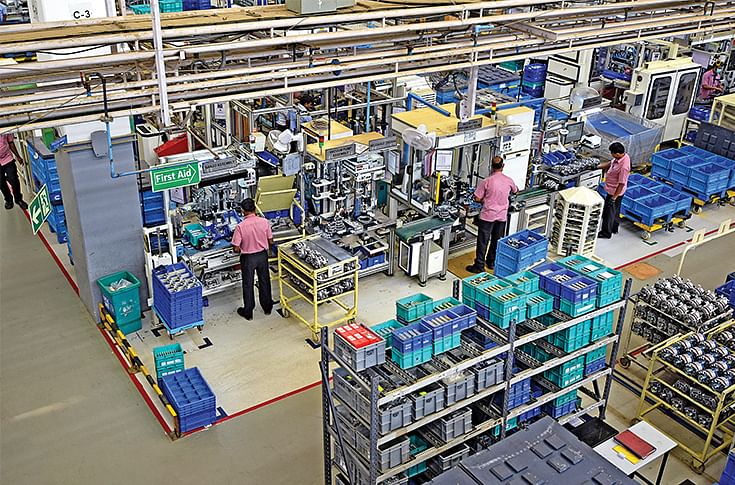

 Shahkar Abidi
Shahkar Abidi


 Darshan Nakhwa
Darshan Nakhwa


